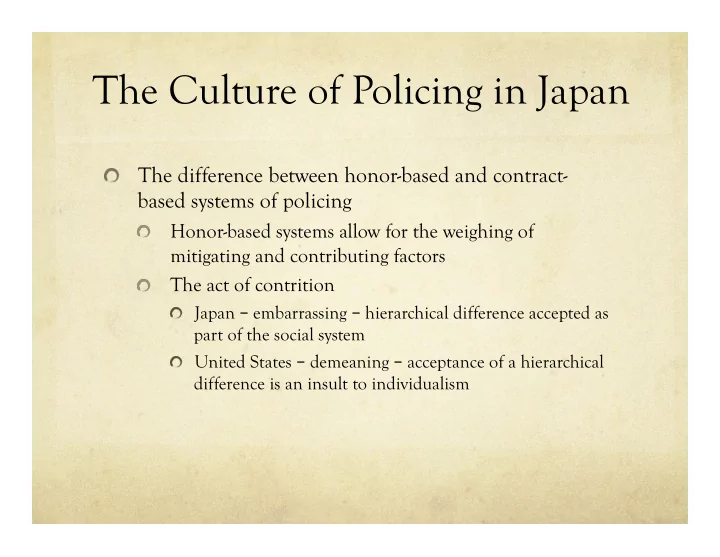

The Culture of Policing in Japan The difference between honor-based and contract- based systems of policing Honor-based systems allow for the weighing of mitigating and contributing factors The act of contrition Japan – embarrassing – hierarchical difference accepted as part of the social system United States – demeaning – acceptance of a hierarchical difference is an insult to individualism
The Culture of Policing in Japan Giri – duty; obligation Ninjo – sympathy one feels for another Meiyo – honor tied to reputation
The Culture of Policing in Japan Culture and Contrition Folktales and personal responsibility – moral different in Japan Goldilocks asks forgiveness for her transgressions The wolf in Little Red Riding Hood is contrite
The Culture of Policing in Japan Clearance rates for serious crimes (1988): Japan Homicide 98% Rape 87% Robbery 78% Assault 93% Larceny 60% United States 20.9% Admission of guilt – prosecuted suspects (1989): Japan 95% United State 50% Admission of guilt all known crimes – overall (1989) Japan 37% United States 5.3%
The Culture of Policing in Japan Incarceration rates (1987): Japan 44.2 per 100,000 United States 228 per 100,000 Recidivism rates (1987): Japan 47% within 3 years United State 41% within 3 years The United States appears to incarcerate many who do need to be separated from society In Japan, incarceration is a last resort Rate significantly lower, recidivism slightly higher
The Culture of Policing in Japan Justice system Adversarial (US) vs. Inquisitorial (Japan—even though the system of justice is based on the US system) In the United States the police officer enforces the law In Japan the police officer is a criminal catcher, teacher, and a moralist
The Culture of Policing in Japan
Yakuza – Organized Crime Japanese Style Yakuza ( Boryokudan ) roots Bakuto – gamblers Tekiya – itinerant peddlers Etymology ya ku sa – eight, nine, three; a reference to a losing hand in the Japanese card game Oicho-Kabu
Yakuza – Organized Crime Japanese Style Why do Yakuza exist? They are functional to society Emile Durkheim – noted the functions of deviance Creates social borders Defines morality Clarifies cultural values Creates in and out groups Fosters social cohesion Brings about social innovation
Yakuza – Organized Crime Japanese Style The relationship between government and Yakuza Yakuza thrive during times of social upheaval Gurentai service the underground economy – Black market hoodlums Tehaishi are Yakuza related labor-brokers The main business of Yakuza – Protection Protection from the harassment of others Protection from those who protect
Yakuza – Organized Crime Japanese Style Sokaiya - corporate blackmailers Predatory Sokaiya - corporate blackmailers who disrupt shareholder meetings Protective Sokaiya those who stop others from disrupting shareholder meetings Minbo – the violent intervention in civil affairs Insurance scams and out of court settlements Debt collection Financial and corporate racketeering Crisis management Jiage – land sharking “Assisting” with lease terminations and property sales
Yakuza – Organized Crime Japanese Style Other sources of income Tekiya – outdoor stalls Clubs, bars and massage houses – protection and occasionally operation Illegal disposing of industrial waste Bankruptcy management Real estate Money-lending Amphetamine dealing [frowned upon] Crisis management Internet scams
Yakuza – Organized Crime Japanese Style Relationships Oyabun-Kobun (father-son) Kyodaibun (brother [older/younger])
Yakuza – Organized Crime Japanese Style Symbols of Yakusa Yubitsume [ enkozume ] - finger amputation Irezumi - body tattoos
Yakuza – Organized Crime Japanese Style
Yakuza – Organized Crime Japanese Style
Yakuza – Organized Crime Japanese Style Commonality of Yakuza/other mafia enterprises All are honor-based enterprises Many of the same business enterprises Protection; Violence (or the threat of); Gambling; Prostitution; Distribution and Sale of Drugs; Bars; Money lending—especially to sub-prime candidates; Real estate “services;” Money Laundering; Scams; Socio-political Intermediaries, etc. Operating outside the recognized and accepted juridical apparatuses
Recommend
More recommend